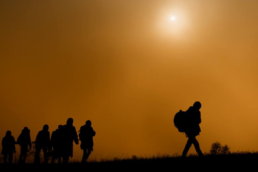Los Angeles producer Rossi Cannon relies heavily on foreign directors and cinematographers to make commercials for brands such as Nike. Cannon, 48, never thought that her access to the global talent pool might be limited.
Now she’s not so sure.
The election of President Trump, she says, has increased anxiety in the entertainment industry about how the new administration’s travel and immigration policies will affect visa applications and wait times for filmmakers and crew members who want to work on productions in the United States.
“It’s scary,” said Cannon, executive producer at Mod/Op Films. “I never thought I wouldn’t be able to work with someone because they wouldn’t be allowed into the country.”
Cannon’s concerns reflect widely shared worries in Hollywood that the administration’s stance could cause headaches for the entertainment industry, which overwhelmingly supported Hillary Clinton. The film and TV business has become increasingly global, with film companies pursuing non-U.S. stars and international co-productions that depend on people’s ability to travel the world with relative ease.
Hollywood’s fears were exacerbated over the weekend after Trump signed an executive order that temporarily blocked travel from seven majority-Muslim countries and halted refugees from around the world on security grounds.
Asghar Farhadi, the Iranian director of Oscar-nominee “The Salesman,” said he would not travel to Los Angeles to attend the Academy Awards ceremony in response to Trump’s executive order.
The Motion Picture Assn. of America, the lobbying arm for the major studios, weighed in. Chris Dodd, the former Democratic senator from Connecticut who heads the MPAA, joined the Hollywood chorus of disapproval against the order that temporarily suspends travel from Iran, Iraq, Libya, Somalia, Sudan, Syria, and Yemen.
“The MPAA is concerned about the impact of the executive order on individuals with legitimate personal and business relationships in the United States,” Dodd said in a statement. “Among those potentiallyaffected are members of the creative community who cannot freely express themselves in their home country and come to the United States seeking the opportunity to communicate and enlighten.”
Although few filmmakers are directly affected by Trump’s travel ban, immigration experts who work with talent say the fear is that broader scrutiny and restrictions will come.
Any overhaul in the visa application process could create delays that will have ripple effects in Hollywood, potentially throwing a wrench into productions that rely on foreign talent, immigration experts said. The Trump administration has indicated it will revise the application process for H-1B visas, one of the more popular visas used for highly skilled workers in fields like technology. Major tech companies have pushed to protect H-1B visas and firms such as Google and Apple were among the first big companies to protest the executive order.
But changes to the visa program could also affect areas such as animation that rely heavily on non-citizens, said Chad Blocker, a partner at New York-based immigration law firm Fragomen, Del Rey, Bernsen & Loewy.
“One challenge for the entertainment industry is you have tight production schedules and it’s necessary for talent to travel to the U.S. in a relatively short time frame,” Blocker said. “If you see the government delaying processing, it’s going to be even more of a challenge.”
Some, however, are optimistic about visa reforms. Rosanna Berardi, an immigration attorney whose clients include TV and film studios, said she believes the proposed changes will, in fact, make the H-1B program more business friendly.
“It’s a very broken system now,” said Berardi, who is based in Buffalo, N.Y.
But for now, uncertainty prevails. Several immigration attorneys said they’ve been bombarded with requests to file and expedite applications for work permits to let foreigners work on U.S. film and television productions. O-1 visas, which cover people with “extraordinary ability” in fields including arts, sciences and athletics, are in high demand.
Although there’s been no explicit indication that the government will restrict O-1 visas, entertainment workers have been racing to make sure they’re covered, said Los Angeles-based immigration lawyer Lorraine D’Alessio.
Since the election, she said, the number of cases her law firm usually handles has tripled. One client, a Swedish citizen who was born in Iraq, passed on a film acting job out of fear he would run into trouble abroad, she said.
Even prior to the executive order, U.S. consulates worldwide were taking more time to review and scrutinize applications, causing delays, D’Alessio said.
“It’s been a real nail-biter,” she said. “Across the board since last weekend’s events, we’re seeing widespread anxiety with producers, directors and actors… People are wondering whether they should invest in certain productions.”
Meanwhile, Hollywood business leaders have expressed misgivings about the temporary clampdown on travel.
21st Century Fox, an entertainment juggernaut with business interests around the world, issued a statement late Monday that stopped short of criticizing Trump’s order, but nonetheless expressed concern about employees who might find it difficult to travel.
“We know this is a time of real uncertainty for many of our colleagues around the world,” read the memo, signed by Fox Executive Chairman Lachlan Murdoch and Fox CEO James Murdoch.
“We want to assure you that we’re doing what we can to assist impacted colleagues and their families.” The company was founded by 85-year-old Rupert Murdoch, who was born in Australia and became a U.S. citizen in 1985. His two sons now run the company.
Source
Ready to have Berardi on your side?
Whether you’re a business looking to hire or a professional hoping to relocate, immigration law can be complicated. But you don’t have to do it alone. Put our experience to work for you.



